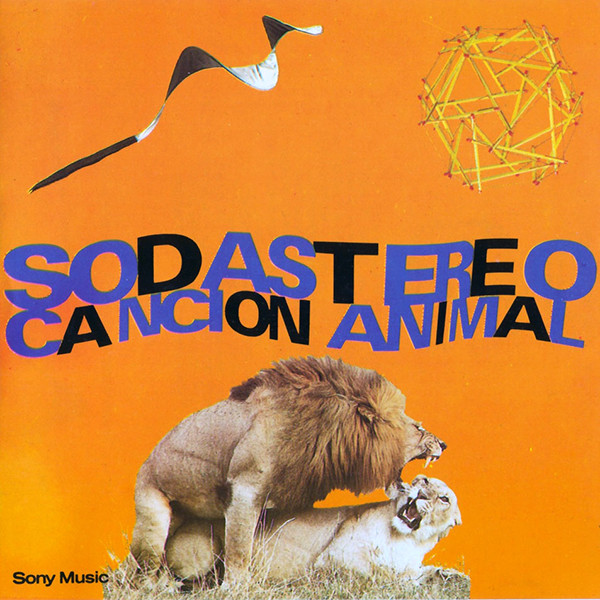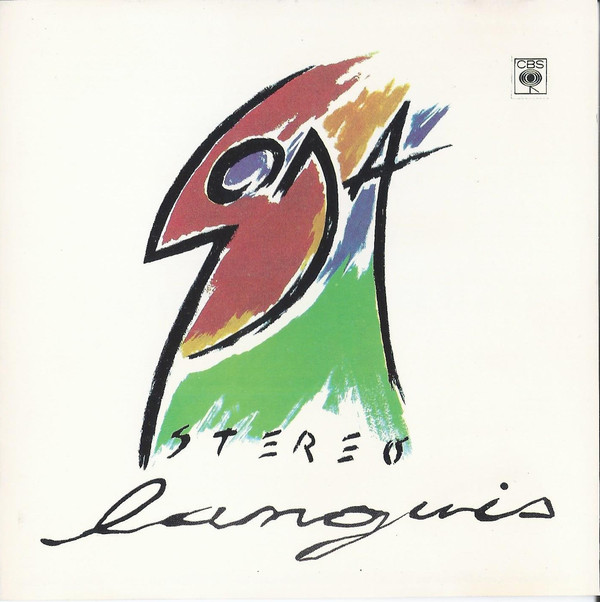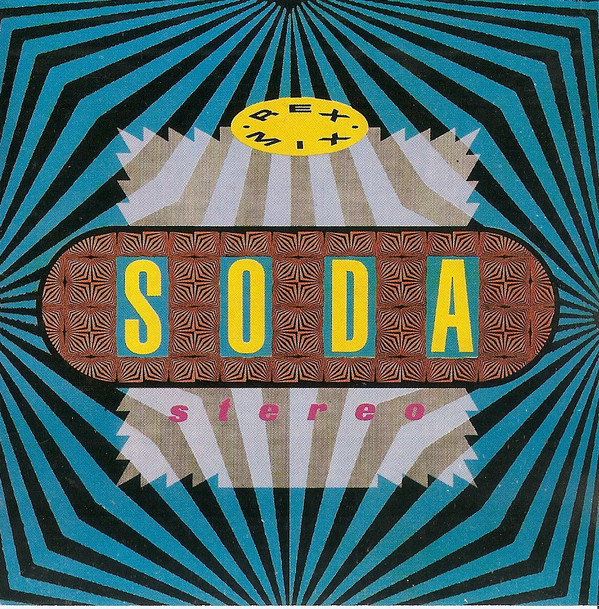
Rock and roll music
From Wikipedia, the free encyclopedia
Leer más
Canción Animal
Soda Stereo
Label: Sony MusicColumbia · · Productor: Gustavo Cerati and Zeta Bosio
|
1
|
(En) El séptimo día
Soda Stereo •
1990 /09
|
4:22 |
|
|
|
2
|
Un millón de años luz
Soda Stereo •
1990 /09
|
5:04 |
|
|
|
3
|
Canción animal
Soda Stereo •
1990 /09
|
4:07 |
|
|
|
4
|
1990
Soda Stereo •
1990 /09
|
3:39 |
|
|
|
5
|
Sueles dejarme solo
Soda Stereo •
1990 /09
|
3:47 |
|
|
|
6
|
de Música ligera
Soda Stereo •
1990 /09
|
3:32 |
|
|
|
7
|
Hombre al agua
Soda Stereo •
1990 /09
|
5:54 |
|
|
|
8
|
Entre caníbales
Soda Stereo •
1990 /09
|
4:06 |
|
|
|
9
|
Té para 3
Soda Stereo •
1990 /09
|
2:25 |
|
|
|
10
|
Cae el sol
Soda Stereo •
1990 /09
|
4:22 |
|
Singles
No singles available
| Canción Animal | ||||
|---|---|---|---|---|
 | ||||
| Studio album by | ||||
| Released | September 17, 1990 | |||
| Recorded | June – July 1990 at Criteria Studios, Miami, FL | |||
| Genre | Alternative rock | |||
| Length | 41:18 | |||
| Label | ||||
| Producer | Gustavo Cerati and Zeta Bosio | |||
| Soda Stereo chronology | ||||
| ||||
| U.S. cover version | ||||
 | ||||
| Singles from Canción Animal | ||||
| ||||
Review
From Wikipedia, the free encyclopedia
Leer más
1990 studio album by Soda Stereo
| Review scores | |
|---|---|
| Source | Rating |
| Allmusic | [1] |
Canción Animal (Spanish for Animal Song) is the fifth album released by the Argentine rock band Soda Stereo, released on September 17, 1990 (see 1990 in music). Many of the songs on the album are among the band`s most popular, such as one of their biggest hits "De Música Ligera", the last song played in Soda Stereo`s last concert in 1997, "Hombre al agua", "Un Millón de Años Luz", "Te para tres" and others. It is considered one of the best and most influential albums in the history of Latin American rock music. The anthemic status of the album, and specifically "De Música Ligera", is perhaps due to the band`s ability to tap into a feeling experienced by almost every Spanish-speaking nation of going from dictatorship (and thus censorship) to freedom at some point during the 20th century.[2] Many regard it as the best album to ever come out of South America.[3] In 2007, the Argentine edition of Rolling Stone ranked it 9 on its list of "The 100 Greatest Albums of National Rock".[4] The album sold 500,000 copies in Argentina alone.[5]
Track listing
All tracks are written by Gustavo Cerati, except where noted[6]
| No. | Title | Writer(s) | Length |
|---|---|---|---|
| 1. | "(En) el Séptimo Día" ((On) The Seventh Day) | 4:23 | |
| 2. | "Un Millón de Años Luz" (A Million Light Years) | 5:03 | |
| 3. | "Canción Animal" (Animal Song) | Cerati, Daniel Melero | 4:06 |
| 4. | "1990" | 3:39 | |
| 5. | "Sueles Dejarme Solo" (You Tend To Leave Me Alone) | 3:46 | |
| 6. | "De Música Ligera" (Of Light Music) | Cerati, Zeta Bosio | 3:32 |
| 7. | "Hombre al Agua" (Man Overboard) | Cerati, Melero | 5:53 |
| 8. | "Entre Caníbales" (Among Cannibals) | 4:06 | |
| 9. | "Té para 3" (Tea for Three) | 2:26 | |
| 10. | "Cae el Sol" (The Sun Sets) | Cerati, Melero | 4:24 |
Chart performance
| Chart (1990) | Peak position |
|---|---|
| Argentina (CAPIF)[7] | 2 |
Personnel
Soda Stereo
- Gustavo Cerati – Lead vocals, guitars
- Zeta Bosio – bass guitar, backing vocals, Chapman Stick on "Canción Animal"
- Charly Alberti – drums, percussion
Additional personnel
- Alfredo Lois – art direction
- Mariano Lopez – engineer / mixing
- Pedro Aznar – vocal arrangement
- Daniel Melero - Keyboards and arrangements
- Tweety González - Keyboards
- Andrea Álvarez - Percussion
- Peter Baleani – production coordination
- Roger Hughes – assistant engineer
- Vanessa Eckstem - assistant
- Adrian Taverna - Band assistant
- Caito Lorenzo & Alfredo Lois - Photography
External links
- Lyrics
- Coveralia - Cancion Animal (album)
- Rate your music - Cancion animal by Soda Stereo
- CDUniverse - Soda Stereo, Cancion Animal CD Album
From Wikipedia, the free encyclopedia
1990 studio album by Soda Stereo
| Review scores | |
|---|---|
| Source | Rating |
| Allmusic | [1] |
Canción Animal (Spanish for Animal Song) is the fifth album released by the Argentine rock band Soda Stereo, released on September 17, 1990 (see 1990 in music). Many of the songs on the album are among the band`s most popular, such as one of their biggest hits "De Música Ligera", the last song played in Soda Stereo`s last concert in 1997, "Hombre al agua", "Un Millón de Años Luz", "Te para tres" and others. It is considered one of the best and most influential albums in the history of Latin American rock music. The anthemic status of the album, and specifically "De Música Ligera", is perhaps due to the band`s ability to tap into a feeling experienced by almost every Spanish-speaking nation of going from dictatorship (and thus censorship) to freedom at some point during the 20th century.[2] Many regard it as the best album to ever come out of South America.[3] In 2007, the Argentine edition of Rolling Stone ranked it 9 on its list of "The 100 Greatest Albums of National Rock".[4] The album sold 500,000 copies in Argentina alone.[5]
Track listing
All tracks are written by Gustavo Cerati, except where noted[6]
| No. | Title | Writer(s) | Length |
|---|---|---|---|
| 1. | "(En) el Séptimo Día" ((On) The Seventh Day) | 4:23 | |
| 2. | "Un Millón de Años Luz" (A Million Light Years) | 5:03 | |
| 3. | "Canción Animal" (Animal Song) | Cerati, Daniel Melero | 4:06 |
| 4. | "1990" | 3:39 | |
| 5. | "Sueles Dejarme Solo" (You Tend To Leave Me Alone) | 3:46 | |
| 6. | "De Música Ligera" (Of Light Music) | Cerati, Zeta Bosio | 3:32 |
| 7. | "Hombre al Agua" (Man Overboard) | Cerati, Melero | 5:53 |
| 8. | "Entre Caníbales" (Among Cannibals) | 4:06 | |
| 9. | "Té para 3" (Tea for Three) | 2:26 | |
| 10. | "Cae el Sol" (The Sun Sets) | Cerati, Melero | 4:24 |
Chart performance
| Chart (1990) | Peak position |
|---|---|
| Argentina (CAPIF)[7] | 2 |
Personnel
Soda Stereo
- Gustavo Cerati – Lead vocals, guitars
- Zeta Bosio – bass guitar, backing vocals, Chapman Stick on "Canción Animal"
- Charly Alberti – drums, percussion
Additional personnel
- Alfredo Lois – art direction
- Mariano Lopez – engineer / mixing
- Pedro Aznar – vocal arrangement
- Daniel Melero - Keyboards and arrangements
- Tweety González - Keyboards
- Andrea Álvarez - Percussion
- Peter Baleani – production coordination
- Roger Hughes – assistant engineer
- Vanessa Eckstem - assistant
- Adrian Taverna - Band assistant
- Caito Lorenzo & Alfredo Lois - Photography
External links
- Lyrics
- Coveralia - Cancion Animal (album)
- Rate your music - Cancion animal by Soda Stereo
- CDUniverse - Soda Stereo, Cancion Animal CD Album
More Albums same artist
Soda Stereo - En El Séptimo Día (Gira Me Verás Volver) · Channel: SodaStereoVEVO · 4m 42s


Soda Stereo - Un Millon De Años Luz (Gira Me Verás Volver) · Channel: SodaStereoVEVO · 6m 50s

Soda Stereo - Canción Animal (1990) (Álbum Completo) · Channel: Studio SC · 41m 24s

Soda Stereo - 1990 (Mil Nueve Noventa) (Official Audio) · Channel: SodaStereoVEVO · 3m 41s

Soda Stereo - Sueles Dejarme Solo (Gira Me Verás Volver) · Channel: SodaStereoVEVO · 4m 23s

Soda Stereo - De Música Ligera (Official Video) · Channel: SodaStereoVEVO · 3m 31s

Soda Stereo - Hombre Al Agua (Gira Me Verás Volver) · Channel: SodaStereoVEVO · 6m 41s

Soda Stereo - Entre Caníbales (Official Visualizer) · Channel: SodaStereoVEVO · 4m 8s

Soda Stereo - Te Para 3 (Audio) · Channel: SodaStereoVEVO · 4m 10s







